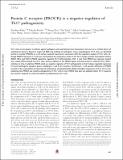Protein C receptor (PROCR) is a negative regulator of Th17 pathogenicity
Author(s)
Kishi, Yasuhiro; Kondo, Takaaki; Xiao, Sheng; Yosef, Nir; Gaublomme, Jellert; Wu, Chuan; Wang, Chao; Chihara, Norio; Regev, Aviv; Joller, Nicole; Kuchroo, Vijay K.; ... Show more Show less
DownloadKishi-2016-Protein C receptor (PROCR) is a neg.pdf (2.330Mb)
PUBLISHER_CC
Publisher with Creative Commons License
Creative Commons Attribution
Terms of use
Metadata
Show full item recordAbstract
Th17 cells are key players in defense against pathogens and maintaining tissue homeostasis, but also act as critical drivers of autoimmune diseases. Based on single-cell RNA-seq profiling of pathogenic versus nonpathogenic Th17 cells, we identified protein C receptor (PROCR) as a cell surface molecule expressed in covariance with the regulatory module of Th17 cells. Although PROCR expression in T cells was controlled by the cooperative action of the Th17 lineage-specific transcription factors RORγt, IRF4, and STAT3, PROCR negatively regulated Th17 differentiation. CD4+ T cells from PROCR low expressor mutant mice readily differentiated into Th17 cells, whereas addition of the PROCR ligand, activated protein C, inhibited Th17 differentiation in vitro. In addition, PROCR acted as a negative regulator of Th17 pathogenicity in that it down-regulated expression of several pathogenic signature genes, including IL-1 and IL-23 receptors. Furthermore, T cell–specific deficiency of PROCR resulted in the exacerbation of experimental autoimmune encephalomyelitis (EAE) and higher frequencies of Th17 cell in vivo, indicating that PROCR also inhibits pathogenicity of Th17 cells in vivo. PROCR thus does not globally inhibit Th17 responses but could be targeted to selectively inhibit proinflammatory Th17 cells.
Date issued
2016-09Department
Broad Institute of MIT and HarvardJournal
Journal of Experimental Medicine
Publisher
Rockefeller University Press, The
Citation
Kishi, Yasuhiro; Kondo, Takaaki; Xiao, Sheng; Yosef, Nir; Gaublomme, Jellert; Wu, Chuan; Wang, Chao, et al. “Protein C Receptor (PROCR) Is a Negative Regulator of Th17 Pathogenicity.” The Journal of Experimental Medicine 213, no. 11 (September 2016): 2489–2501. © 2016 Kishi et al.
Version: Final published version
ISSN
0022-1007
1540-9538